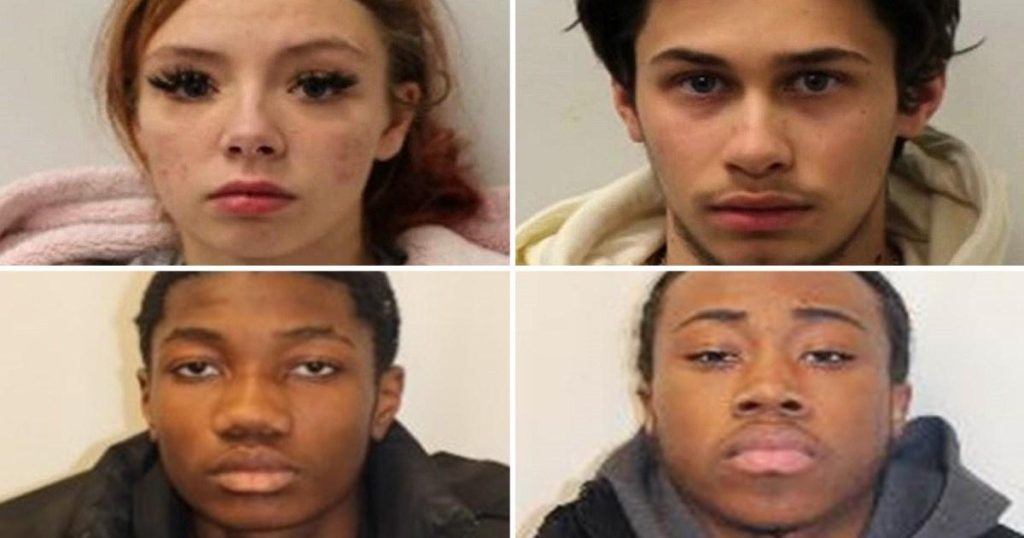On February 10th of last year, a harrowing incident unfolded in Harrow, North West London, culminating in the brutal stabbing and beating of an 18-year-old transgender woman. Lured to a roller disco under the guise of a party invitation, the victim was ambushed by a group of five teenagers. The premeditated attack was swift and merciless, involving punches, kicks, stamps, and nine stab wounds inflicted by Summer Betts-Ramsey, a 20-year-old member of the group. The assault was punctuated by a torrent of transphobic slurs, highlighting the hateful motivation behind the violence. The victim’s survival was attributed solely to the intervention of passersby who interrupted the attack and provided crucial assistance. The physical and emotional scars of this traumatic event continue to haunt her, disrupting her sleep and serving as a constant reminder of the ordeal.
The perpetrators of this heinous crime, Summer Betts-Ramsey, Bradley Harris, Camron Osei, Shiloh Hindes, and a 17-year-old boy whose identity remains protected due to legal restrictions, were subsequently apprehended and brought to justice. All five admitted to causing grievous bodily harm with intent, while Betts-Ramsey also pleaded guilty to possession of a knife. The court proceedings revealed a disturbing narrative of premeditation, betrayal, and callous disregard for human life. The judge presiding over the case, Judge Philip Katz KC, characterized the attack as “abhorrent,” explicitly linking it to the victim’s gender identity and denouncing the group’s “distorted notion of revenge.” The group’s subsequent behavior further underscored their depravity, as they boasted about their actions, taunting the victim and sharing videos of the assault on social media platform Snapchat.
The genesis of this targeted violence stemmed from an encounter between the victim and Harris the month prior to the attack. Following an intimate moment at Harris’s residence, the victim’s transgender identity was disclosed to Harris by a third party. Upon confronting the victim, Harris brandished a knife, threatening violence if she lied about her identity. The victim, feeling intimidated, confirmed her transgender status. This revelation proved to be the catalyst for the subsequent attack, as Harris shared the information with the other members of the group, fueling their animosity and setting the stage for the brutal assault at the roller disco.
The sentencing hearing brought a measure of closure to the victim and highlighted the severity of the crime. Betts-Ramsey, deemed a “dangerous offender” by Judge Katz, received the harshest sentence: eight-and-a-half years in youth detention, with a mandatory four-and-a-half years to be served in custody. Harris, Osei, and Hindes, all 18 years old, each received three-year sentences in youth detention. The 17-year-old boy was given a youth rehabilitation order. The sentencing sparked an emotional outburst from a spectator in the public gallery, underscoring the raw emotions surrounding the case.
The attack itself was a frenzied and coordinated assault. The group, dressed in dark clothing with masks and hoods, lay in wait for the victim at a bus stop. Upon her arrival at a nearby car park, she was immediately ambushed, leaving her no opportunity to defend herself. Betts-Ramsey led the assault, stabbing the victim repeatedly while the others rained down punches and kicks. The relentless attack lasted approximately 45 seconds before the perpetrators fled the scene. The victim’s injuries were severe, requiring extensive medical attention and leaving her with lasting physical and emotional scars.
The case also involved a 17-year-old girl who, although not part of the initial planning, joined in the attack and robbed the victim’s handbag. She will be sentenced separately after pleading guilty to robbery and possession of cannabis. This incident underscores the broader societal issues surrounding transphobia and violence against transgender individuals. The case serves as a tragic reminder of the ongoing need for awareness, education, and societal change to combat prejudice and protect vulnerable communities. The victim’s resilience in the face of such horrific violence offers a beacon of hope, while the sentences handed down send a strong message that such acts of hate will not be tolerated. The aftermath of this case calls for continued focus on supporting victims, addressing the root causes of transphobic violence, and fostering a society that embraces inclusivity and respects the dignity of all individuals.


